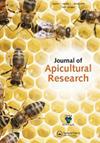一项关于美国管理蜂群损失的全国性调查:2017-18、2018-19和2019-20年蜜蜂知情伙伴关系的结果
IF 1.8
4区 农林科学
Q2 ENTOMOLOGY
引用次数: 18
摘要
摘要十多年来,美国养蜂人经历了管理蜜蜂(Apis mellifera)群落的大量损失。长期、多年的监测工作对于为这些损失提供时间和空间背景至关重要。为了记录和解释这些损失,蜜蜂知情伙伴关系自2011年春季以来对管理的蜜蜂群落进行了全国调查,继续了美国养蜂检查员于2007年春季首次委托进行的调查工作。在这里,我们展示了2017–18、2018–19和2019–20三年的调查结果。每年,根据管理的蜂群数量——后院(≤50个蜂群)、副业(51-500个蜂群)和商业(>500个蜂群),估计并比较三个损失期(夏季、冬季和年度)和三种养蜂作业类型的蜂群损失率。在国家层面上,我们在2018-2019年记录了最高的冬季蜂群损失率(37.7%),而2019年是夏季损失率最高的一年(32.1%)。正如过去的调查所记录的那样,我们观察到,与大型经营类型相比,小型后院养蜂人的冬季损失率最高。同样,与其他经营类型相比,商业养蜂人在夏季的损失率更高。总的来说,我们的研究结果突出了美国蜂群损失率的时间变异性,特别是在损失期和年份之间,并表明养蜂作业规模的强烈影响。本文章由计算机程序翻译,如有差异,请以英文原文为准。
A national survey of managed honey bee colony losses in the USA: results from the Bee Informed Partnership for 2017–18, 2018–19, and 2019–20
Abstract Beekeepers in the United States have experienced high losses of managed honey bee (Apis mellifera) colonies for more than a decade. Long-term, multi-year monitoring efforts are crucial to provide a temporal and spatial context to these losses. To document and explain these losses, the Bee Informed Partnership has conducted national surveys on managed honey bee colonies since spring 2011, continuing the work of surveys first commissioned by the Apiary Inspectors of America in spring 2007. Here we present survey results from three years – 2017–18, 2018–19, and 2019–20. Each year, colony loss rates were estimated and compared among three loss periods – summer, winter, and annual – and three beekeeping operation types based on their number of colonies managed – backyard (≤50 colonies), sideline (51-500 colonies), and commercial (>500 colonies). At the national level, we recorded the highest winter colony loss rates (37.7%) in 2018–2019, while 2019 marked the year with the highest summer losses (32.1%). As documented in past surveys, we observed that smaller scale backyard beekeepers experienced the highest winter loss rates when compared to the larger operation types. Similarly, commercial beekeepers experienced higher loss rates during the summer compared to the other operation types. Overall, our results highlight the temporal variability, specifically among loss periods and years, of colony loss rates in the United States, and suggest a strong effect of beekeeping operation size.
求助全文
通过发布文献求助,成功后即可免费获取论文全文。
去求助
来源期刊
CiteScore
4.80
自引率
10.50%
发文量
111
审稿时长
6-12 weeks
期刊介绍:
The Journal of Apicultural Research is a refereed scientific journal dedicated to bringing the best research on bees. The Journal of Apicultural Research publishes original research articles, original theoretical papers, notes, comments and authoritative reviews on scientific aspects of the biology, ecology, natural history, conservation and culture of all types of bee (superfamily Apoidea).

 求助内容:
求助内容: 应助结果提醒方式:
应助结果提醒方式:


